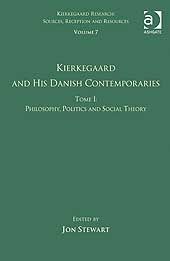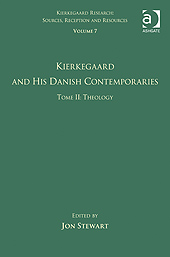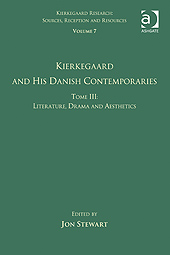
Kierkegaard Research: Sources,
Reception and Resources
|
||

  |
||

|
Volume 7: Kierkegaard and his Danish Contemporaries
Tome I: Philosophy,
Politics and Social Theory Farnham and Burlington: Ashgate 2009. xix+329pp.
The period of Kierkegaard’s life corresponds to Denmark’s
“Golden Age,” which is conventionally used to refer to the
period covering roughly the first half of the nineteenth
century, when Denmark’s most important writers, philosophers,
theologians, poets, actors and artists flourished. Kierkegaard
was often in dialogue with his fellow Danes on key issues of the
day. His authorship would be unthinkable without reference to
the Danish State Church, the Royal Theater, the University of
Copenhagen or the various Danish newspapers and journals, such
as The Corsair, Fædrelandet, and Kjøbenhavns flyvende Post,
which played an undeniable role in shaping his development.
Tome I: Philosophy, Politics and Social Theory
Tome I is dedicated to
exploring the sources that fall under the rubrics, “Philosophy,
Politics and Social Theory.” With regard to philosophy, Danish
scholars of the day were profoundly influenced by German
idealism. Through their efforts the philosophies of Kant,
Schelling and Hegel made their way to Denmark. Kierkegaard read
the works of all of these Danish thinkers and their German
antecedents. While he was sympathetic to individual ideas
offered by this tradition, he was generally keen to criticize
the German model of philosophy and to propose a new paradigm for
philosophical thought that was more in tune with lived existence.
Kierkegaard also experienced the dynamic period in history that
saw the great upheavals throughout Europe in connection with the
revolutions of 1848 and the First Schleswig War. While it has
long been claimed that Kierkegaard was not interested in
politics, recent research supports a quite different picture. To
be sure, he cannot be regarded as a political scientist or
social theorist in a traditional sense, but he was nonetheless
engaged in the issues of his day, and in his works one can
certainly find material that can be insightful for the fields of
politics and social theory.
Andreas Frederik Beck:
A Good Dialectician and a Bad Reader
Jens Finsteen Giødwad:
An Amiable Friend and a
J. Michael
Tilley
Finn Gredal Jensen
and the Danish
Constitution Tome II is dedicated to the host of Danish theologians who played a greater or lesser role in shaping Kierkegaard’s thought. In his day there were a number of competing theological trends both within the church and at the Faculty of Theology at the University of Copenhagen, and not least of all in the blossoming free church movements. These included rationalism, Grundtvigianism and Hegelianism. In this quite dynamic period in Danish ecclesial history, Kierkegaard was also exercised by a number of leading personalities in the church as they attempted to come to terms with key issues such as baptism, civil marriage, the revision of the traditional psalm book, and the relation of church and state.
Table of Contents
Adolph Peter
Adler: A Stumbling-Block and an Inspiration
Ally of
Kierkegaard
Peter
Christian Kierkegaard: A Man with a Difficult Heritage
Jon Stewart
Tome III: Literature, Drama and Aesthetics
Hans Christian Andersen: Andersen was just an Excuse
“…Madvig shall
stand unchanged”
of a Danish
Philologist
|
Kierkegaard and the Bible,
Kierkegaard and the
Kierkegaard and the
Patristic and Medieval Traditions
Kierkegaard and his
Kierkegaard and his
|
|
The
series Kierkegaard Research: Sources,
Reception and Resources is published Routledge Research, Philosophy
Routledge / Taylor & Francis Group, 711 Third Ave., Eighth Floor, New York, NY 10017, USA
|
||










